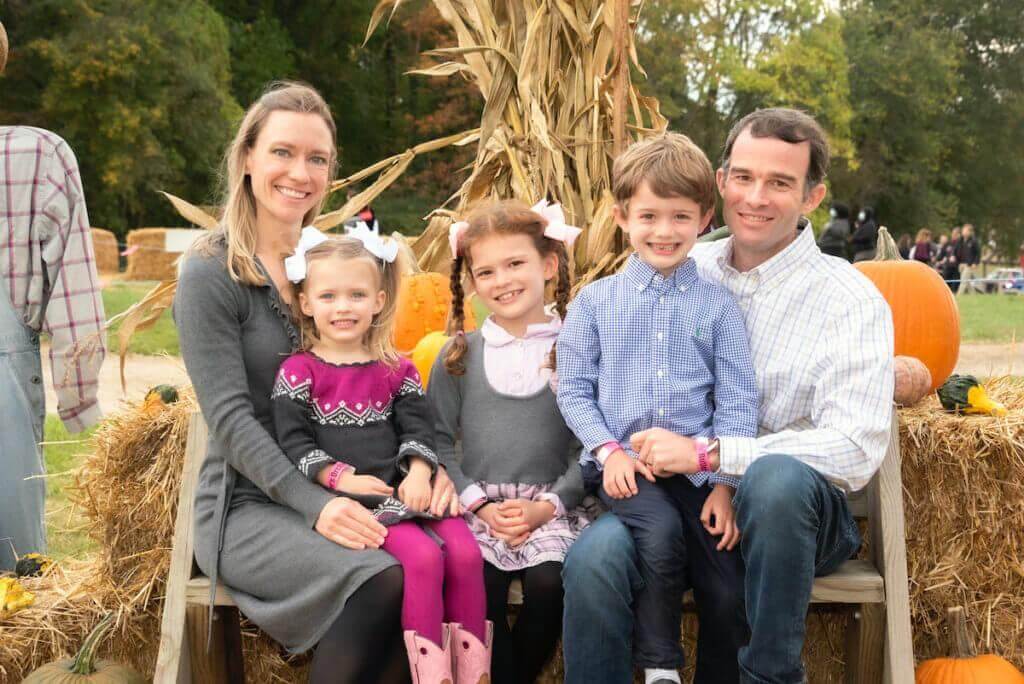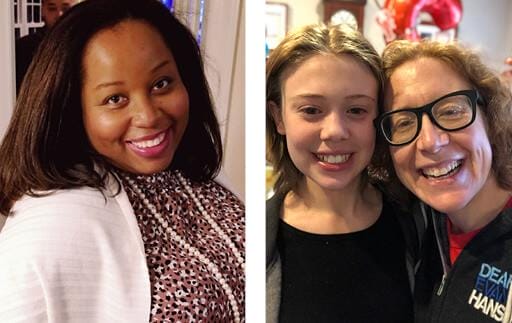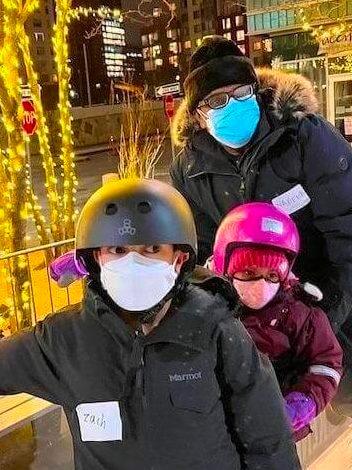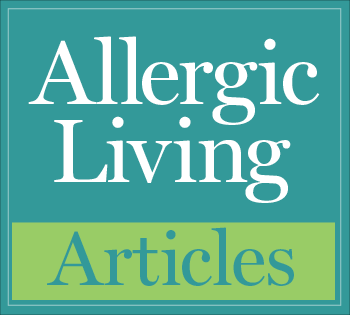
When an allergist diagnosed Rebecca Sager’s baby daughter with allergies to dairy, egg, peanuts and tree nuts, the mother felt like her world was turned upside down. After that appointment in 2010, Sager sat in their car bawling, knowing this diagnosis, confirmed by skin testing, would be life-changing. Yet, she was being sent on her way with zero resources and no counseling.
“It was a terrible experience. I was told, ‘she’s severely allergic, she could die, here’s a prescription for an EpiPen,’” said Sager of Fairfax, Virginia. She was left scrambling to figure out how to feed Tilly, and how to safely put her in daycare a few months later without knowing anyone else with food allergies who could provide guidance.
Tilly, who’s now 12, also developed allergies to sesame and mustard, as well as having eczema and asthma.
Given her “you’re on your own” introduction to allergies, Sager jumped at the chance to act as a mentor when she heard Children’s National Hospital in Washington, D.C. was undertaking a novel pilot intervention study, to support parents of young children newly diagnosed with food allergies.
“How much I would have loved if she got her diagnosis, and the allergist referred me to a mentor,” Sager said.
Tilly has been a patient at Children’s National since she was about 4, where she also has been working in sessions with Dr. Linda Herbert, director of the psychosocial clinical program for the division of allergy and immunology.
LaKesha Robinson of Washington, D.C., also remembers unsuccessful attempts to find support and information when she was learning to manage food allergies for her two children, both diagnosed as babies.
“Medical advisement prepares you for what to do in the case of an exposure to an allergen, but there was a missing piece to the puzzle. How do you and your children learn to thrive while managing food allergies?” asks Robinson. She would also become a mentor in the pilot Food Allergy Parent Mentoring Program.
Power of Parent Mentoring
Dr. Ashley Ramos, a pediatric psychologist at Children’s National, along with Herbert and other colleagues, developed the pilot mentoring study. Those being mentored were parents of children under age 5, who had been diagnosed with food allergies within a year. Ramos says that driving the decision to create the program was the need to support parents who often feel isolated or overwhelmed following a child’s food allergy diagnosis.
The study, which ran from April 2018 through January 2020, involved eight mentors helping 10 mentees, whose kids had been diagnosed with food allergies (between one and eight allergens) for less than a year. Not only did mentees prove receptive to the peer support, the study found these parents felt allergy stress lessen, and they felt more supported, and more confident in how to manage food allergies.

“We heard that having a shared lived experiences with their mentor led to feeling understood, gaining valuable knowledge about how to manage food allergy in daily life, and provided a sense of understanding about what food allergy management might look like in later developmental stages,” says Ramos, the study’s lead author.
“We’re learning all of these lessons along the way, so why not help someone else if we can make it just a smidge easier,” Sager says. She guided her mentee through putting her son in daycare; helped her redirect her in-laws away from trying to show love with unsafe food; and introduced her to allergy-friendly candy and non-food prizes for celebrations.
Ramos and Herbert trained the mentors to focus on active listening, providing empathy, offering practical advice and knowing when it was appropriate to direct mentees to a medical professional. Once mentors were trained and matched with mentees, they connected through phone calls, text and emails as often as needed, as part of the program’s six-month intervention.
Planning for ‘What-Ifs’
Robinson, whose children are now 10 and 12 years old, was happy to share the information that she and her family have learned while managing allergies to dairy, eggs, tree nuts, peanuts, sesame, shellfish, fish and sunflower allergies. She helped her mentee plan a trip, guiding the mom on how to approach feeding her food-allergic infant son safely in new environments, and plan for the “what-ifs” to avoid allergen exposures.
She sees great value in peer mentorship for parents of children who are newly diagnosed. “There is so much to adjust to when learning how to manage food allergies.“
Laura Gray agrees. The practical advice she received from her mentor about issues such as what to eat while breastfeeding or how to keep epinephrine at the proper temperature on a bike ride, eased some of her stress. It was especially helpful that she had a mentor so soon after her youngest daughter Callie experienced anaphylactic reactions at four months and five months of age. Callie, now 4 years old, is allergic to peanuts, sesame, walnuts, pecans, and has eczema. She has outgrown allergies to dairy and egg.
“There is so much to process, and there are so many aspects of living with food allergies that you don’t predict,” says Gray, who learned about the program from colleagues at Children’s National, where she works as a clinical psychologist in the pain clinic.
Birthday Party Mentoring
Gray’s mentor was especially helpful when the mother was nervous about planning Callie’s first birthday celebration. Talking through her concerns helped to calm Gray, and made her feel validated about the stress she was feeling.
The mentor assisted Gray with logistical aspects of planning an allergy-friendly party, such as providing a dairy-free icing recipe for the cake, and helping develop a sign for the front door. It asked guests not to bring in outside food and to wash their hands. With a good plan, “I had the parameters that I was able to control and let the kids celebrate,” Gray says.
She finds talking to someone with wisdom and prior experience with food allergies is so helpful. Gray remains in touch with her mentor, and the mentors we spoke to maintain a connection with their mentees.
Ramos is hopeful that funding will come through within the next year for a proposed large-scale clinical trial of the parent mentoring program. She says psychologists and a nurse scientist at Children’s National are applying for a grant for the program. The idea is that it would be adapted to meet the needs of parents of various chronic illnesses, including food allergies, Type 1 diabetes and celiac disease.
For anyone considering a similar program, Ramos stresses the importance of planning and “being attuned to the needs of both mentors and mentees. That was critical to the success of the program,” she says.
Benefit of Allergy Buddies
Another program recognizing the psychological impact of living with food allergies, focuses on mentoring kids. The Food Allergy Buddies Program, developed by the MassGeneral Hospital for Children Food Allergy Center in Boston, groups teens in high school and college (Bigs) with younger kids (Littles). They share issues and advice in a private Facebook group, then participate in virtual and in-person activities.
Buddies program director Dr. Michael Pistiner worked with a parent advisory committee for about two years before launching the program in January 2020 – with 28 Bigs and 59 Littles. “We’re creating a community,” says Pistiner, director of food allergy advocacy, education and prevention for the MassGeneral Hospital for Children Food Allergy Center.

Zach and Lyla Yusuff of Cambridge, Massachusetts enjoy participating in activities like ice skating as part of the Buddies community. Six-year-old Lyla, who is allergic to peanuts, tree nuts, eggs, milk, citrus, mustard and sunflower seeds, loves art projects and was especially happy to decorate T-shirts during a park event.
A virtual chef-led cooking lesson was a highlight for Zach, 10, who is allergic to peanuts, tree nuts, egg, shellfish, milk and sesame. Making a chicken and rice bowl using spices that he hadn’t tried before “pushed us to branch out of what we normally make,” said his dad Naeem Yusuff.
Those activities allow kids to enjoy themselves while the older kids can impart valuable management strategies and serve as role models in how they manage their own allergies, Pistiner says.
“These high school students have really embraced their roles as mentors,” says program co-director Dr. Maria Theodorakakis, who trains the mentors and provides a curriculum for each event. The Bigs then brainstorm to personalize the activities for their groups of Littles.
The interaction between the mentors and the younger students, whether they are discussing a movie character or talking about their favorite sport, makes the young participants feel seen, says Theodorakakis, a pediatric psychologist in the Department of Psychiatry at MassGeneral.
“Seeing older kids manage their allergies while still engaging in fun activities would have inspired a young me,” says Julian Balkcom, 22, who volunteers as an intern for the program while studying developmental health and psychology as a master’s student at Tufts University. He has been with the program since he was an undergrad student
It is important to show younger children that they can be successful, and not let food allergies be the only thing that defines them, says Balkcom. He would know about this – as one who’s allergic to peanuts, tree nuts, fish, shellfish, sesame and sunflower seeds, and most legumes, plus managing asthma and eczema.
Community and Connection
Balkcom can clearly recall feeling isolated as a child because of food allergies, for example as the only kid not able to eat cake at a birthday party. Zach, too, is often in situations as the only kid carrying an epinephrine auto-injector. In the Buddies program, he finds it helpful that “you meet other kids with food allergies.”
The program also gives his dad a chance to share experiences with the other parents about navigating school or finding a safe restaurant. “It’s nice to connect with other people going through the same thing,” Yusuff says.
That connection to others navigating food allergies is a crucial component, whether mentoring parents or kids. “It’s a lifeline that I didn’t have for a long time and I think it could have made the journey less rocky,” Sager says.
Related Reading
Why We Need Certified Allergy Nurse Educators
Dr. Linda Herbert Video: Managing Food Allergy Anxiety
Food Allergy Mom’s Advice: Going to Birthday Parties





